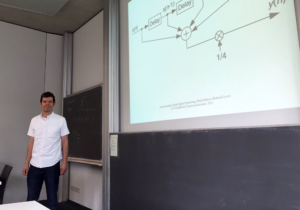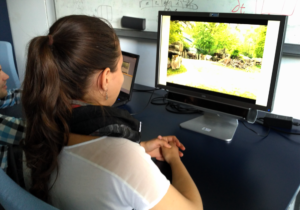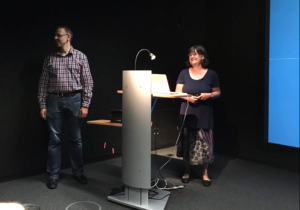“Quantifying User-centered Experiences (QUE-2016)” was the title of the the 1st Summer School for Visual Computing at the University of Stuttgart, organized by the SFB-TRR 161. From 2nd to 6th of July, about 40 PhD students from America, Hungary and Germany met at the Institute for Visualization and Interactive Systems (VIS) and the Visualization Research Center (VISUS) to learn about visual computing and discuss current questions, trends and activities in data analysis, human-computer interaction, visualization or eye tracking. During these five days the young academics could talk about their current research activities, and exchange their know-how and their experience in the academic world.
At the end of the summer school we asked the participants for their perspective on the research seminar and how they benefited from the covered topics …
“We had the opportunity to attend the QUE-2016 Summer School at the Visualization Research Center of the Universität Stuttgart, that aimed to provide researchers with broad knowledge about topics relevant to our research, and to equip us to recognize and collaboratively resolve potential problems with our research. The varied backgrounds of the participants allowed an interesting and fruitful conversations. We shared our expertise and different perspectives with one another. We dipped our toes into the world of visual computing through a diverse series of talks: Andrew Kun taught the basics of digital signal processing, Albrecht Schmidt spoke on the challenges and potential of context-aware user interfaces, and Markus Funk introduced us to some of the latest research in augmented reality. We learned about the importance of careful experiment design from Niels Henze and Lewis Chuang, and picked up the basics of eye tracking and EEG signal processing from Valentin Schwind and Jakob Karolus, Menja Scheer, and Lewis Chuang. These talks only scratched the surface of all that HCI has to offer, but through hands-on workshops we were able to put what we learned into action.
Outside the classroom, we learned about each other’s ongoing work through a poster session and many coffee break chats. We also enjoyed some social time with the summer school attendees, ranging from a boat ride in Tübingen, to a Euro Cup viewing, to an American Independence Day barbecue. All in all, the summer school enabled us to broaden our thinking about our own research and cultural contexts, in addition to giving us an opportunity to learn about new areas of HCI.”
Taylor, Aditi, Natalie and Anna
Students in Computer Engineering and Cognitive Science, Engineering Design,
Cognitive Science, Statistics and Machine Learning
“What is your research question? – This was the essence of Margit Pohl’s presentation on qualitative and quantitative research. It is the most important thing a researcher has to have in mind, while doing research. The variables, the method, the data analysis and the whole research process should be based on the research question. If a problem occurs, the researchers should go back to the research question and solve the problem based on it. That is why it is so important to have a good research question, because it is the solid base of the scientific value of our work.”
Balint
PhD student in Management
“It was an amazing course. Its main topic was human-computer interaction, and it had a very special atmosphere. The students and the lecturers came from different countries with different backgrounds. The only thing connecting them was the passion for researching and the interest in human-computer interaction. During the summer school participants had the opportunity to listen to talks about different topics like Digital Signal Processing, Statistics, Experiment Design, Eye Tracking or Application Research. These talks provided a good basis for meaningful conversations on various aspects of the specific field. There was a chance to participate in brainstorming sessions which yielded in creative ideas on several special topics. Hands-on and poster sessions helped a lot deepening the gained knowledge and getting up to date on the ongoing research topics. Besides these the general conversations were also very useful, for me especially the carrier advices of experienced researchers turned out to be very helpful.”
Anna
MSc student in Mechanical Engineering Modelling
“The summer school was a great experience for me. In my opinion the cultural diversity and the different research backgrounds of the participants were the key elements of the summer school’s success. The scientific and intellectual atmosphere induced valuable discussions about human-computer interaction questions and helped us to deepen our knowledge. The whole summer school made a powerful impression on me. I got useful and practical advice on how to be a better researcher.”
Dalma
PhD student in Psychology
“I learned a lot about EEG and Eye tracker signal processing which are very common tools now a days in my research field. The hands-on sections provided us useful experiences about the filtering process as well. We had opportunity to visit the amazing and modern lab in SimTech we tried several different kind of eye tracker and Virtual reality devices. Most importantly we got new relationship with other students and senior researchers.”
Mark
PhD student in Psychology




